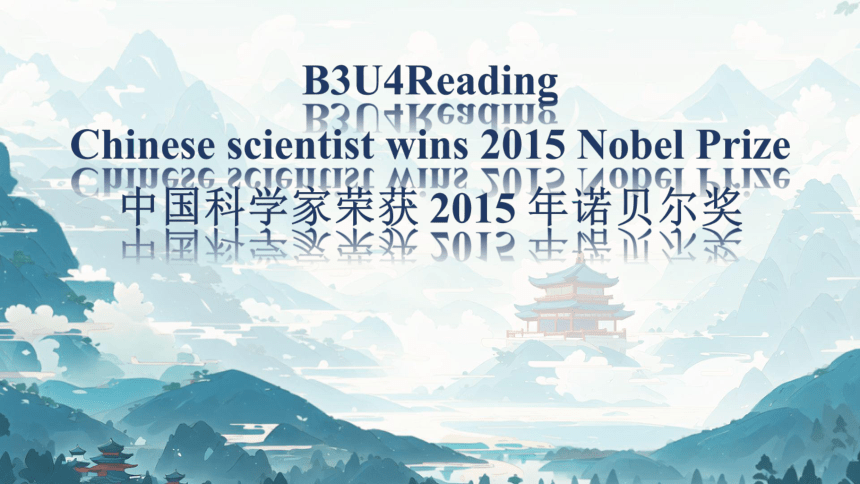(
课件网) B3U4Reading Chinese scientist wins 2015 Nobel Prize 中国科学家荣获 2015 年诺贝尔奖 Tu Youyou has become the first female scientist of the People’s Republic of China to receive a Nobel Prize, awarded for her contribution to the fight against malaria, one of the deadliest diseases in human history. Thanks to her discovery of qinghaosu, malaria patients all over the world now have had a greatly increased chance of survival. 屠呦呦成为中华人民共和国首位获得诺贝尔奖的女科学家。她获奖是因为她 为抗击疟疾所做出的贡献———疟疾是人类历史上最致命的疾病之一。得益于她发 现的青蒿素,如今全世界疟疾患者的存活率大大提高。 Born in 1930, in Ningbo, Zhejiang Province, Tu studied medicine at university in Beijing between 1951 and 1955. After graduation, she worked at the Academy of Traditional Chinese Medicine. She completed further training courses in traditional Chinese medicine, acquiring a broad knowledge of both traditional Chinese medicine and Western medicine. 1930年,屠呦呦出生于浙江宁波。1951 年至 1955 年,屠呦呦在北京读大学,学习药学。毕业后,她在中医研究院工作。她完成了中医领域的培训课程深造,获得了广泛的中西医知识。 Tu’s education was soon to prove very useful. In the 1960s, many people were dying of malaria, and in 1969 Tu became head of a team that intended to find a cure for the disease. She collected over 2,000 traditional Chinese medical recipes for malaria treatment and made hundreds of extracts from different herbs. When they failed to produce any promising results, Tu referred to the ancient books of traditional Chinese medicine again. 屠呦呦接受的教育很快被证明非常有用。20 世纪 60 年代,许多人死于疟疾,于是 1969 年屠呦呦担任了一个旨在找到疟疾疗法的小组组长。她收集了 2,000 多种治疗疟疾的中药配方,并从不同的草药中获取了数百种提取物。当这些未能取得任何有希望的效果时,屠呦呦就再次查阅中医典籍。 Inspired by an over 1,600-year-old text about preparing qinghao extract with cold water, Tu redesigned the experiments and tried extracting the herb at a low temperature in order not to damage its effective part. On 4 October 1971, after 190 failures, she succeeded in making qinghao extract that could treat malaria in mice. 在一本 1,600 多年前的典籍中,关于用冷水制备青蒿提取物的记载给了屠呦呦启发,她重新设计了试验,并尝试在低温下对这种草药进行提取,以不损害其有效成分。1971 年 10 月 4 日,在历经 190 次失败之后,她成功制备出可以治疗老鼠疟疾的青蒿提取物。 However, it was hard to produce enough qinghao extract for large trials because research resources were limited. Tu and her team managed to find solutions to the problem. When there was no research equipment, they had to extract herbs using household water containers. They worked day and night and their health began to suffer because of the poor conditions, but they never gave up. 然而,由于研究资源有限,很难制造出足够的青蒿提取物用于大规模试验。屠呦呦团队成功找到了解决这个问题的方法。当时没有研究设备,他们只好用家用储水的容器来提取草药。他们夜 ... ...

